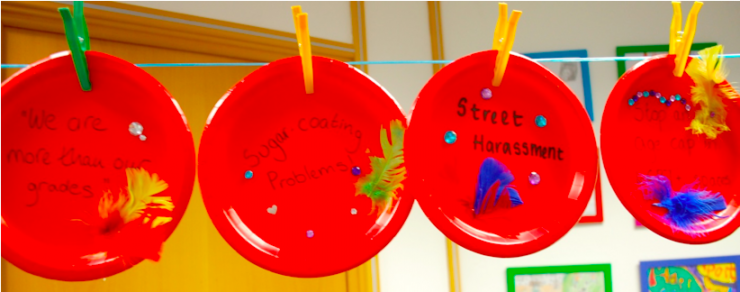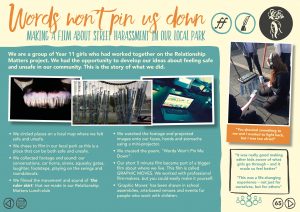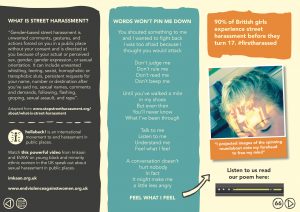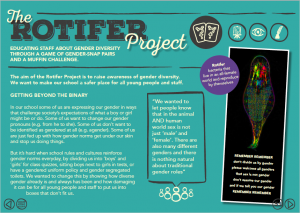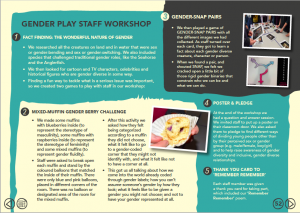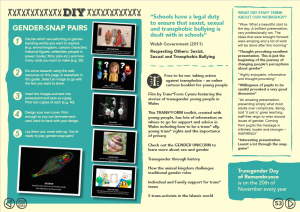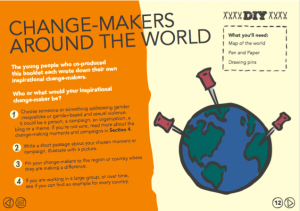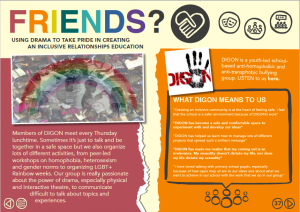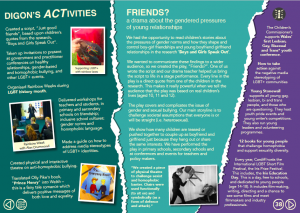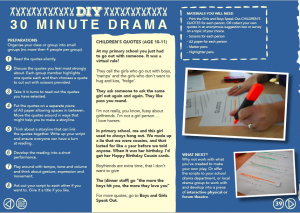With recent global activism for gender equality fuelled by #MeToo, #TimesUp and more – there is growing momentum behind campaigns for gender parity. Mass public engagement with these hashtags has fuelled unprecedented media attention to sexual harassment and assault. However, for many of those working in the field of gender and education these stories of pervasive rape culture are unsurprising. The question remains: How can we challenge these issues in and through education? And what can we learn from what educators and students are already doing?
From Women’s History Month to International Women’s Day (IWD) on March 8th and International Transgender Day of Visibility on March 31st, this month presents a number of unique opportunities to address sexual and gender equality in schools, colleges, universities and beyond. In the spirit of this year’s IWD campaign theme #PressforProgress, GEA will be spotlighting the work of our members in challenging gender and sexual inequities. First up is a guide to utilising AGENDA as a teaching and learning resource for schools.
Utilising AGENDA as a teaching and learning resource
AGENDA: A young people’s guide to making positive relationships matter is a free online guide developed with young people, for young people. It has been designed so that 11-18 year olds can explore the issues they are interested in at their own pace.
Produced collaboratively between Professor Emma Renold from Cardiff University, the Children’s Commissioner of Wales, NSPCC Cymru and Welsh Women’s Aid, AGENDA has played a significant role in informing the Welsh Government’s report on the Future of the Sex and Relationships Education in Wales. Additionally, Professor Emma Renold recently joined First Minister Carwyn Jones at the United Nations in New York to discuss how Wales is advancing gender equality through resources such as AGENDA, the SRE report and Welsh government legislation on violence against women.
AGENDA showcases the different ways in which young people in Wales and across the world have raised awareness of a wide range of issues, including: gender equalities and discrimination, consent, LGBQ & T+ rights, bullying and sexual harassment, street harassment, female genital mutilation, sexual exploitation and relationship abuse.
The AGENDA working group have developed a variety of lesson starters and activities that draw on the AGENDA resource. Originally devised for the Welsh Baccalaureate Qualification, but adaptable to any classroom, these lesson activities create a range of student-led learning opportunities around healthy relationships.
This lesson activity invites students to:
• Explore international awareness raising days on a wide range of issues (e.g International Women’s Day), and the non-governmental organisations (NGO) that support them
• Consider the issues that these awareness-raising days and NGO’s address and why
• Assess different modes of change (e.g online petition, school assembly) and their strengths or weaknesses
• Develop their own ideas for campaigns addressing their chosen issue
Accompanying this lesson activity are a series of community challenges for student-led projects. These challenges come with a brief and key resources that help develop learners’ skills, whilst encouraging them to identify, develop and participate in opportunities that will benefit the community. Community challenges include:
• Championing Gender Diversity
• Supporting LGBTQ+ Rights
• Campaigning for Healthy Relationships
Case Study One: Relationship Matters
The Relationship Matters project tells the story of one youth-led school-based group who used a range of creative media, from poems and films to wearable visual art, to raise awareness of girls’ experiences of sexual harassment online, at school and in their community. In a series of listening assemblies they collected comments from over 300 students to influence and shape their own school’s whole-school SRE provision and future SRE policy and practice across Wales. Watch their film here: “Words Won’t Pin Me Down”.
This case study was recently submitted to the Women and Equalities Committee’s public inquiry into the sexual harassment of women and girls in public places.
Case Study Two: The Rotifer Project – Educating staff about gender diversity
The Rotifer Project was initiated from a staff and student concern that the school needed to do more to raise awareness of gender diversity in the context of gender equity to better support the increasing number of transgender identifying students, and sexism, homophobia and transphobia. From a clear aim to make the school a safer and more inclusive space, a small group of students from the LGBT and feminist school-based youth groups set about creating a resource, sparked from their own experiences, and their own research into the issues. The groups were fully supported by the PSE and safe-guarding lead, inclusion officer and gender and sexuality academic experts.
This lesson activity follows the same pattern as the above, but focuses on change-makers around the world. It also features a global activist crossword puzzle and answer sheet.
Accompanying this lesson activity is a Global Challenge supporting students to acquire knowledge and understanding of how creative activisms on social justice issues are using art to support projects across the world.
This lesson activity invites students to:
• Explore case studies from young people making a difference around gender inequalities
• Develop their own ideas for a research project exploring their chosen issue
Accompanying this lesson activity are a series of Individual Proposals for student-led projects. Each proposal includes links to a wide range of resources to support students in developing their research ideas including: useful websites; primary data sources; blogs and vlogs; key researchers in the field with links to their research papers. Individual Proposal topics include:
• Selfie Culture
• Youth Feminist Activism
• Intimacy and Friendships
• Digital Gaming
Case Study Three – Friends? A drama and resource on the gendered pressures of young relationships
The following case study provides an example of children and young people from the youth group DIGON actively and creatively engaging with research findings on issues that are often normalised and consequently remain invisible in many SRE programmes.

